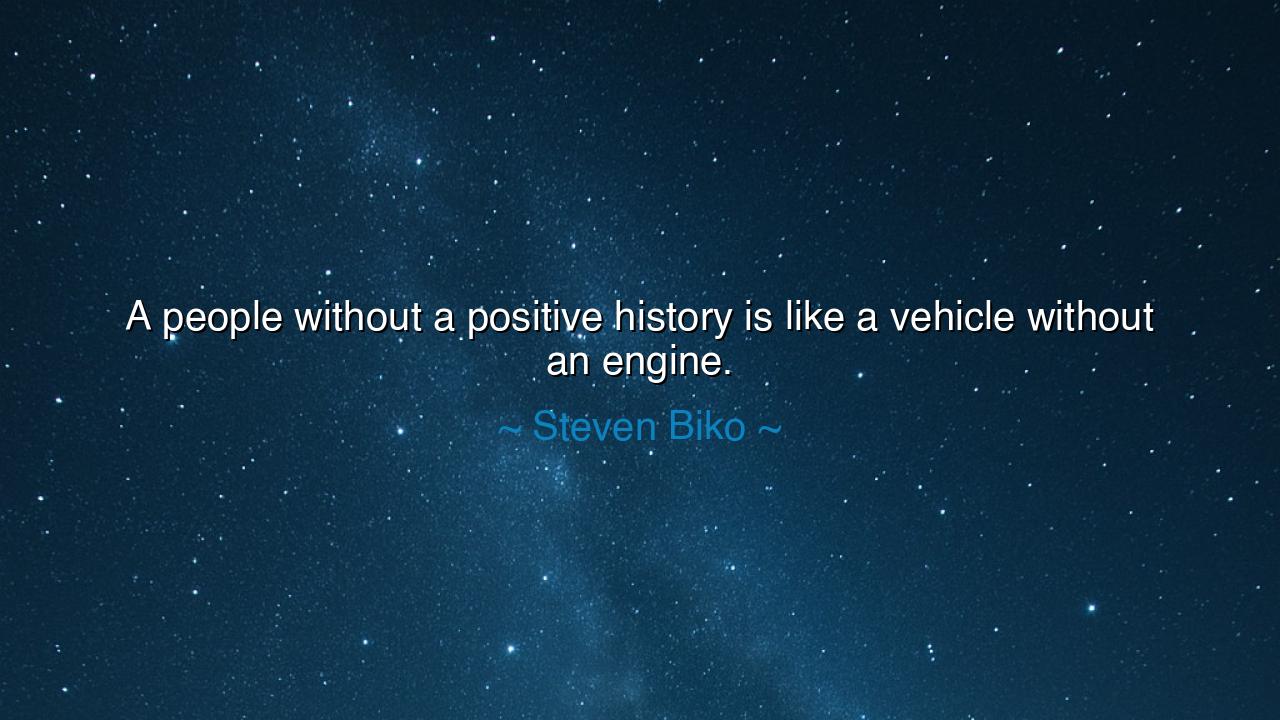
A people without a positive history is like a vehicle without an






“A people without a positive history is like a vehicle without an engine.” – Steven Biko
From the depths of struggle and the silence of oppression, Steven Biko spoke words that were not merely a call, but a resurrection. In this quote, he spoke to the soul of a nation — to those whose history had been stolen, twisted, or buried beneath the weight of colonization. His message is timeless: that a people who do not know their history, or who have been taught to despise it, cannot move forward. For history is not a chain that binds; it is the engine that propels — the power that gives direction, purpose, and identity.
Biko lived in a South Africa bound by the cruel architecture of apartheid, where the black majority were taught that their past was primitive, their culture inferior, their language unworthy. To rob a people of their positive history is to steal the very fire of their spirit. It is to tell the eagle that it was born to crawl, to convince the lion that its roar is shameful. Biko understood that no freedom could be won by arms alone; the battle had to be fought first within the mind. “The most potent weapon in the hands of the oppressor,” he said, “is the mind of the oppressed.” Thus, reclaiming history became an act of rebellion — an awakening of the heart.
To understand his vision, one must recall the story of Africa before the fall of her kingdoms. There were empires like Mali, whose scholars filled the libraries of Timbuktu with knowledge that illuminated the world; Ethiopia, whose ancient faith defied conquest; Great Zimbabwe, whose stone towers stood as testaments to ingenuity. These were not myths, but living proof that Africa had once been a cradle of wisdom and power. Yet, centuries of conquest sought to erase these truths, replacing them with a narrative of weakness and darkness. When Biko called for a positive history, he called for remembrance — not of pain, but of greatness.
Without such remembrance, a nation drifts like a vehicle without an engine, moving only when pushed by others, never by its own will. Consider the years after colonization, when so many newly freed nations struggled to find direction. The flag was new, but the mind was still enslaved. Their youth had been taught foreign heroes but forgotten their own. Their songs praised the conqueror but not the ancestor. This, Biko warned, was the silent tragedy: independence without identity, motion without meaning.
But when people rediscover pride in their heritage, the world trembles at their awakening. Think of the Harlem Renaissance in America, when Black artists, writers, and thinkers — Langston Hughes, Zora Neale Hurston, Duke Ellington — turned pain into poetry and reclaimed beauty from the ashes of bondage. Or the rise of postcolonial movements across Africa and Asia, where once silenced tongues began to sing again in their native languages. These were engines roaring to life after long silence. Each act of cultural revival was a declaration: We remember who we are.
So hear this, children of tomorrow: your history is not a burden — it is your engine. It is what turns despair into strength and confusion into direction. To lose it is to wander in circles; to claim it is to chart your destiny. Study the stories of your ancestors, not as relics, but as roadmaps. Celebrate their triumphs, learn from their errors, and let their courage burn within you. Do not let the voices of others define your worth. For when you carry the memory of your people with honor, no chain can bind you, no lie can hold you.
In your life, seek out your roots. Read the words of your elders. Learn the songs that once echoed in your land. Teach your children to walk with heads high, for they walk in the footsteps of giants. Let your positive history be your compass, your shield, and your strength. And when the world tries to tell you who you are, let your own past answer with thunder: We have always been — and we shall always rise.






AAdministratorAdministrator
Welcome, honored guests. Please leave a comment, we will respond soon